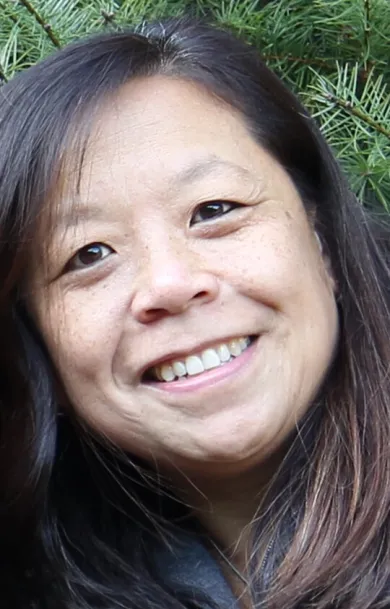March 30, 2017
| by Luke StangelIt’s a scene that’s played out at countless kitchen tables: A kid with a heavy textbook tries to make sense of some homework as her mom or dad reads over her shoulder, struggling to recall snippets of relevant lessons they learned themselves decades earlier.
This is where then-Intuit executive and Stanford Graduate School of Business graduate Ginny Lee found herself two years ago: sitting with her sixth grader as he struggled to understand a complex math concept.

Ginny Lee | Photo Courtesy
“I’m trying to read the textbook, which is quite dense, and I’m trying to be a chapter ahead of him so that I look like I know what I’m talking about as a parent,” Lee recalls. “I said, ‘You know what? This is too hard.’ We Googled it, got on Khan Academy, watched a two-minute video, and both my son and I looked at that and were like, ‘OK, we get it.’”
Late last year, Lee became president and chief operating officer of Khan Academy, a nonprofit online education company. She recently sat down with Insights by Stanford Business to talk about what she learned from her career at Intuit, why she left, and what Khan Academy has planned for the future of education.
Boston Roots
Lee learned the value of education from her parents, even as they had little formal schooling themselves. “Neither of them graduated from high school, but yet they instilled in us the importance of education,” Lee says.
The youngest of eight siblings, she grew up in inner city Boston. Her parents were first-generation immigrants who didn’t speak English; her father worked as a waiter at a Chinese restaurant and her mother worked as a seamstress at a sweatshop.
She earned a spot in the prestigious Boston Latin School, a public school that provides college prep-level instruction. Lee recalls not having enough money to buy SAT prep textbooks, and instead studying for the test from library books. Private SAT tutoring was financially impossible, she says.
Still, she got accepted to Brown University, and although getting through school was financially challenging, she graduated with dual degrees in business economics and organizational behavior and management. After Brown, she went on to earn her MBA at Stanford Graduate School of Business.
Leadership Lessons at Intuit
One of Lee’s mentors urged her to join a company that aligned with her values around putting the needs of employees and customers over the needs of shareholders. She says she would have likely bounced around Silicon Valley if she hadn’t focused on seeking out a compatible corporate culture early in her career.
She chose Intuit, joining as manager of its operations group in 1996. At the time, the company was 13 years old, with a little over 3,100 employees and revenue of $538 million.
Intuit’s “values are such that if you focus on employees first and make it a great place to work, [those employees] will in turn do some amazing things for your customers, and revenue will come,” Lee says.
Most young employees get too distracted looking up the corporate ladder, she says. “It’s great to be goal-oriented and look forward to the next job, but the way to get the next job is to be really darn good at the job you’re currently doing,” Lee says. “Oftentimes, I’ve mentored a lot of people where they have their sights on the future job so much that they’re not really focusing on doing the best job today.”
Transitioning Priorities
By 2014, Lee was one of 12 senior vice presidents at Intuit, which had grown to 8,000 employees and annual revenue of $4.5 billion. Her teenage daughter was starting to tour college campuses, and Lee says she felt like she was at a crossroads.
“You can have it all — a wonderful career, a wonderful family, a wonderful everything — but getting it all at the same time is very difficult,” Lee says. “I felt that this was my time to take a step back, focus more on the family and my children and come back to it.”
For Lee, “stepping back” meant taking a role at Alpine Partners as a CEO in Residence, helping the firm evaluate potential deals.
Then, late last year, her executive coach introduced her to Khan Academy founder Sal Khan, who was looking for a president and COO to help him run the operational side of the nonprofit. Joining Khan Academy brought Lee full circle. “I get to go back to what I’m very passionate about — education — and provide it for those who are underserved and underprivileged,” she says.
The Future of Online Education
Khan Academy launched in 2009 as a library of videos recorded by Khan and hosted on YouTube. Today, it’s a nonprofit with 150 employees, 12 million monthly learners, and the mission of providing a free, world-class education to anyone, anywhere. The nonprofit’s YouTube channel has 3 million subscribers.
The company wants to grow to 100 million learners per month in the next three to five years, Lee says. To get there, they’re translating courses into other languages, expanding into the humanities, and building tools for teachers.
Embedding Khan Academy’s curriculum into a lesson plan can help teachers see exactly which concepts the class is struggling with and which students need more help, Lee says.
“There’s never a way to replace a teacher, nor would we ever entertain that,” Lee says. “It’s really about helping teachers, providing tools, to help in what they do best, which is help students learn.”
For media inquiries, visit the Newsroom.






